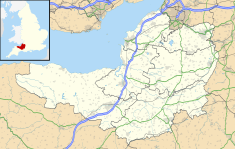Historic site in Somerset, England
| Somerset Place | |
|---|---|
 | |
| Location | Bath, Somerset, England |
| Coordinates | 51°23′35″N 2°22′09″W / 51.39306°N 2.36917°W / 51.39306; -2.36917 |
| Built | 1790-1820 |
| Architect | John Eveleigh |
| Listed Building – Grade I | |
| Official name | Nos 5 to 20 (consec) Somerset Place |
| Designated | 12 June 1950 |
| Reference no. | 443615 |
 | |
Somerset Place is a Georgian Grade I listed crescent in Bath, England. The facades were designed by the architect John Eveleigh, who went bankrupt during the creation of the building, which started in 1790 but was not completed until the 1820s.
In 1784 Thomas Paine purchased an area of pasture including Great Lydes to build houses overlooking Bath, although there is evidence of Iron Age and Roman settlement on the area. Twenty houses were originally planned, but numbers 1 to 4 were not built.
Some of the crescent was destroyed during the Second World War and rebuilt as student accommodation in the 1950s and 1960s for Bath College of Domestic Science. It used to form part of the campus of Bath College, but has since been sold. It was used for student accommodation and the Bath Spa University English Language Programme.
In the 2010s a major redevelopment of the western end of the terrace took place, including the construction of No. 4.
References
- ^ "Nos 5–20, Somerset Place, Bath". Images of England. English Heritage. Archived from the original on 18 October 2012. Retrieved 10 January 2009.
- "Historical and archaeological building report on Somerset Place, Sion Hill Bath" (PDF). House Historians. Retrieved 7 March 2011.
- "Entire Bath crescent up for sale". BBC News. BBC. 17 September 2005. Retrieved 26 February 2009.
- Ham and Doulting Stone
This article about a listed building in the United Kingdom is a stub. You can help Misplaced Pages by expanding it. |
This article about a Somerset building or structure is a stub. You can help Misplaced Pages by expanding it. |